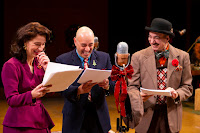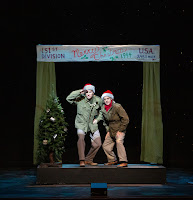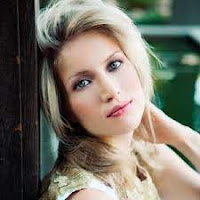Close Encounters with Music, Great Barrington, MA
December 12, 2021
by Michael J. Moran
Since the second live concert by Close Encounters with Music at the Mahaiwe was subtitled “Berlin, Paris, New York,” an ingratiating account of the 1924 Gershwin classic “Fascinating Rhythm” by tenor William Ferguson and pianist Ieva Jokubaviciute was an apt and delightful opener. CEWM Artistic Director and cellist Yehuda Hanani then introduced the program with his trademark humor and erudition, gleefully quoting Cole Porter’s “Anything Goes” to characterize the vocal and instrumental music of the 1920's.
Pianist Renana Gutman next brought dazzling dexterity to the almost shockingly modern-sounding 1927 “Five Jazz Etudes” by Czech composer Erwin Schulhoff, who perished in a Nazi prison camp in 1942. American Samuel Barber’s 1927 cello sonata followed, a “sunny piece,” in Hanani’s words, “without an ounce of cynicism,” written when the composer was just seventeen. Hanani and Jokubaviciute were expressive in the opening “Allegro ma non troppo,” tender and mercurial in the central “Adagio,” and visceral in the “Allegro appassionato” finale.
For the second half of the concert, Ferguson and Jokubaviciute were joined by mezzo-soprano Heather Johnson in a wide-ranging selection of more and less familiar songs by composers active in all three cities during the 1920s. While projected translations of the French and German lyrics would have been helpful, both singers enunciated their texts so clearly and acted them so skillfully that their meaning always came through in the Mahaiwe’s plush acoustic.
Highlights included: Johnson’s incisive “Supply and Demand” by Hanns Eisler and Bertolt Brecht, her sensuous “Speak Low” by Kurt Weill and Ogden Nash, and her dramatic “La Vie en Rose” by Marguerite Monnot and Edith Piaf. Ferguson’s varied trio of chansons by Francis Poulenc, his powerful “Bilbao” by Weill and Brecht, and his lively rendering of Dave Frishberg’s hilarious “Another Song about Paris” were a fitting tribute to the recently deceased jazz master; and Jokubaviciute’s exquisitely sensitive and versatile pianism throughout the program.
Next up for CEWM is a “Folk and Baroque” program, featuring guitarist Eliot Fisk, contralto Emily Marvosh, and Hanani, at St. James Place in Great Barrington on February 26, 2022.
All Mahaiwe events require proof of vaccination and a photo ID for entrance and masking inside the theater.























